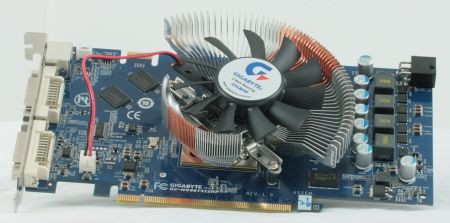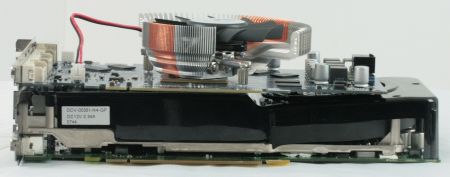Nvidia's GeForce 8800 GTS 512 MB
The Review, Continued
On the other hand, the Gigabyte card we received is carving its own path. Aside from a blue and shorter PCB (19.8 cm against 23 cm for the reference design, which should make all the difference in certain casings) thanks to a simplified power supply stage, Gigabyte replaced the original and impressive cooling system with a more modest Zalman VF700 AlCu which is an aluminium and copper hybrid. Apart from a little weight-loss, it also allows the card to occupy only one slot at the back of the case although the size of the cooling system still prevents the usage of a card next to this 8800 GTS 512 MB. The only down sides are the heat that is no longer rejected directly outside the case and the RAM (still Qimonda 1 GHz) that no longer has a heatsink, although it's still being cooled by the fan's air flow.
The more attractive Gigabyte model
The difference in size is obvious
We note as well that this card doesn't support Triple-SLI, which is exclusively for the 8800 GTX and Ultra (you have to admit that without it, those two cards no longer have anything in their favour on paper)
Test Setup
| Hardware | |
|---|---|
| CPU | Intel Core 2 Duo E6850 (3 GHz) |
| Motherboard | Asus P5K3 Deluxe |
| Memory | Kingston 2 x 1024 MB in DDR-3 800 5-5-5-15-21 |
| Hard Disk | Hitachi T7K250 250 GB |
| DVD ROM | Optical Drive DVD Asus 12x |
| Power Supply | Tagan U15 Easycon 530 W |
| Software | |
| OS | Windows XP Pro |
| Drivers | ForceWare 169.06Catalyst 7.11 |
For this review, we spread the results for each game on three different charts, each chart corresponding to a resolution (with or without antialiasing) and thus to a type or flat screen.
Get Tom's Hardware's best news and in-depth reviews, straight to your inbox.
Current page: The Review, Continued
Prev Page Sparkle And Gigabyte Cards, The Review Next Page Test Drive Unlimited-
eisley Hi, this is a tricky question, I think. I'm curious. How come a 5 year old video card is only 9 tiers down below the more recent and super powerful 7970 GHz Ed.? (From your most recent Graphics Card Hierarchy Chart) And also it is 8 tiers above the pretty cool Intel HD Graphics 4000?Reply
Does that mean its specs and 512 MB are enough to work with media and play nicely most nowadays games? (at medium-high settings?) I know that does not only depend on the video card, but that chart suggest that.
This can be silly, but I'm looking for a video card like this one. I have a Core 2 Duo E8400 3Ghz/4Gb/IntelQ45 machine that I'd like to improve by adding this video card. Any piece of advice? I'd appreciate it very much. (I know I can try upgrading to some Core 2 Quad, but I'm not to much into games nor editing).
Mostly, what I'd like, besides casual medium-high settings gamming, is what I see in my monitor (videos, images, Windows 7 user interface) is crisp and clear, -much- more than usual. I like high-definition views :)
Please, advice me on that matter. Thank you for your review. That video card looks like it's amazing. And is not that expensive.
- Leo.
(Cheers from Peru!)
Pd: My pc is an original HP Compaq dc7900 Convertible Minitower PC. And my monitor is a Full HD TV (LG LD650) I have another 3D one, and use this one for my comp. And, I'd like the video card to have an HDMI port to conect through it this monitor I use. DVI does the same? Btw.
-
eisley I think I should have said "my monitor will be a Full HD TV (LG LD650)." I couldn't get it to work with my pc cause I need a cable. Which I thought I had. I'll write more details soon. Going to reply the other post. Thanks. ^^Reply

